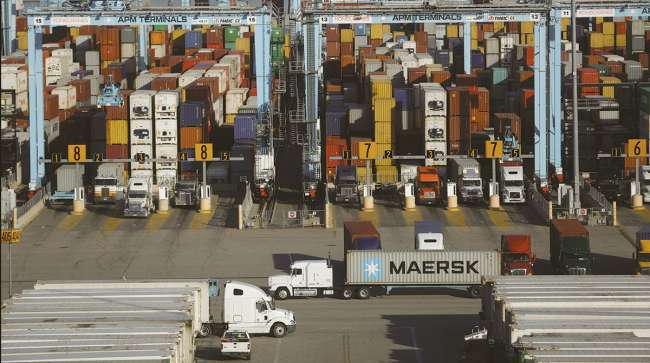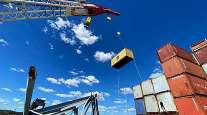Staff Reporter
Va. Port Onboards Baltimore Truckers Amid Cargo Diversions

[Stay on top of transportation news: Get TTNews in your inbox.]
As diverted Baltimore cargo lands in Virginia, Delaware, Pennsylvania and Florida, truckers and port officials are working out processing details and committed to helping.
Maryland cargo continues to be rerouted since March 26 when a Francis Scott Key Bridge segment collapsed after being struck by a container vessel leaving the Port of Baltimore.
The Port of Virginia, which started handling diverted Baltimore cargo hours after the bridge disaster, is welcoming Maryland truckers and reaching out to help onboard them. It also adjusted opening times to better accommodate their arrival times, said Joe Harris, port senior communications director.
Since most Baltimore cargo is expected to land at the port’s Virginia International Gateway, it is now open an hour earlier at 5 a.m. to better suit Maryland truckers retrieving cargo since they travel longer distances to pick up loads.
Harris said the Port of Virginia is focused now on helping Maryland motor carriers integrate their data into its reservation system to ensure seamless transactions when they arrive.
“We’re helping them with that onboarding process. We look forward to servicing them and hope they have a good experience at the Port of Virginia. We also know they are faced with a lot of road time, and we wish them well. We’re going to do everything we can to help them out,” he noted.
To underscore these efforts, the Port of Virginia welcomed new truckers on its Facebook page with information about its “Operations Portal” and a guide to accessing its facilities.
“From our PRO-PASS reservation system to our expansive chassis pool, the Port of Virginia’s Operations Portal (operations.portofvirginia.com) contains all the important links, resources and information for working with the port. Have additional questions? Contact our dedicated Customer Service team at https://tinyurl.com/ContactPOV,” the April 2 notice stated.
We would like to welcome new motor carriers to The Port of Virginia! Our team wants to ensure your experience is as seamless & efficient as possible. Before your first visit, please go to https://t.co/FYbrnv84Hb for a step-by-step guide on accessing our facilities. pic.twitter.com/OHH4NTCqO4 — The Port of Virginia (@PortofVirginia) April 1, 2024
Harris said the Port of Virginia has adequate terminals, people, technology and cargo conveyance equipment to handle cargo surges.
“We’re going to be able to digest this Baltimore cargo, and it’s not going to result in any kind of degradation of delivery of service or efficiency,” he said. “We have ample container capacity, and we’ll be able to absorb this very easily.”
Since the port is geared more for containers, discussions are taking place about how to handle sizable roll-on/roll-off shipments normally headed to the Port of Baltimore.
“While we have ro-ro capabilities, we’re not a big ro-ro port,” Harris said. “We will be able to handle some ro-ro, but a pretty limited amount. We’re assessing that capability right now. It’s my understanding that the ro-ro solution basically stretches from Florida to New England, and we’ll be a part of that.”
Florida Trucking Association CEO Alix Miller said FTA “works closely with the Florida Ports Council and the 16 public seaports in the state. If and when ships are diverted to Florida, we stand ready to assist.”
Congratulations to @alixpmiller — a tireless trucking advocate and President & CEO of @FloridaTrucking — on receiving the TAEC President’s Leadership Award. #ATAmce23 pic.twitter.com/BIa6g0rjTG — American Trucking (@TRUCKINGdotORG) October 15, 2023
PortMiami spokesperson Suzy Trutie revealed April 2, the port “has not been impacted, nor has anyone reached out to us.”
Although Florida’s Jacksonville Port Authority foresees a minimal impact, diverted Baltimore cargo already is coming through, said Chelsea Kavanagh, Jaxport chief communications officer.

Kavanagh
“Because much of the displaced cargo is bound for the northeast U.S., ports closer to that area are more likely to be directly impacted. We expect the impact to Jaxport to be relatively small,” Kavanagh said. “On April 1, Jaxport accommodated one breakbulk [noncontainerized cargo] ship diverted from Baltimore to Jacksonville.
“In addition, later this week, we expect to discharge additional breakbulk cargo that would have gone to Baltimore from a ship already scheduled to call Jacksonville.”
Delaware also is handling diverted cargo, according to Port of Wilmington operator Enstructure.
President and CEO Rebecca Oyler won the TAEC’s President’s Award today at the ATA’s MCE!!! pic.twitter.com/iiatmsDXIT — PMTA (@P_M_T_A) October 23, 2022
“Enstructure offers our full support to the state of Maryland, the Maryland Port Administration and the Port of Baltimore in the wake of the Francis Scott Key Bridge tragedy,” said Bayard Hogans, president of Enstructure’s Mid-Atlantic region. We have handled cargoes diverted from Baltimore, and we remain ready to support the broader region’s critical international trade operations during this challenging time.”
With the Port of Philadelphia also seeing diverted cargo, Pennsylvania Motor Truck Association CEO Rebecca Oyler pledged truckers there will assist as needed.
“The thing about truck drivers and trucking companies that’s always amazed me is their resiliency. They’re constantly dealing with challenges — road closures, restrictions, detours and even disasters,” Oyler said. “Our members are rolling with the punches and finding routes that will ensure their deliveries happen as quickly and as safely as possible, and they’ll continue to do that no matter what.”
Greg Hewitt of DHL Express considers whether the trucking industry is prepared for a greener future. Tune in above or by going to RoadSigns.ttnews.com.
Meanwhile, Baltimore port truckers have received welcome assistance from the state after a letter sent a few days earlier on their behalf to state Transportation Secretary Paul Wiedefeld by Louis Campion, CEO of the Maryland Motor Truck Association. Campion asked for several temporary regulatory assistance measures to help port truckers.
Maryland agreed to temporarily waive International Fuel Tax Agreement requirements for port truckers to mitigate economic impacts from the Baltimore bridge closure.
From March 30 to May 31, Maryland is waiving IFTA licensing and decal requirements for motor carriers hauling freight to or from a seaport, said state Comptroller Brooke Lierman, who also waived penalties for affected IFTA licensees who may have difficulties filing their quarterly IFTA tax returns by an April 30 deadline.
Want more news? Listen to today's daily briefing below or go here for more info:





